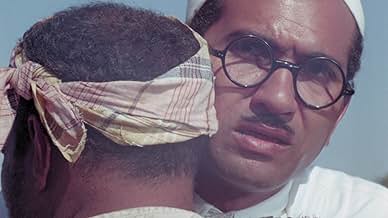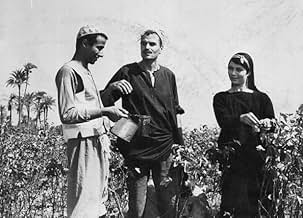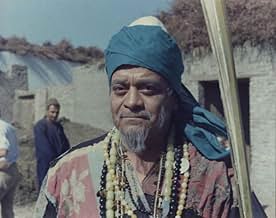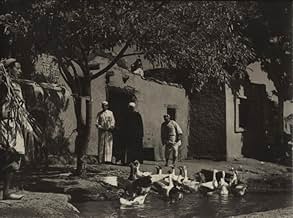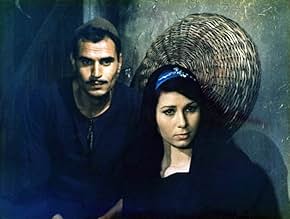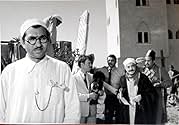Al-ard
- 1970
- 2h 10min
CALIFICACIÓN DE IMDb
8.0/10
2.7 k
TU CALIFICACIÓN
Agrega una trama en tu idiomaA small peasant village's struggles against the careless inroads of the large local landowner. The Land shows why political oppression does not necessarily lead to a sense of solidarity amon... Leer todoA small peasant village's struggles against the careless inroads of the large local landowner. The Land shows why political oppression does not necessarily lead to a sense of solidarity among the disinherited.A small peasant village's struggles against the careless inroads of the large local landowner. The Land shows why political oppression does not necessarily lead to a sense of solidarity among the disinherited.
- Dirección
- Guionistas
- Elenco
- Premios
- 1 nominación en total
Mahmoud El Meligy
- Muhammad Abu Swelim
- (as Mahmoud El-Meliguy)
Ali El Sherif
- Diab
- (as Ali El Scherif)
Tawfik El Deken
- Khedr
- (as Tewfik El Dekn)
- Dirección
- Guionistas
- Todo el elenco y el equipo
- Producción, taquilla y más en IMDbPro
Opiniones destacadas
"Either you keep your mouths shut or you die."
"I'd rather die."
They're very different films, but perhaps this would fit in a trilogy about the struggle for water resources, alongside Chinatown (1974), and Dry Summer (1964). There is a larger story here too, one that's specific to a time and place, 1930's Egypt, but also universal and timeless. Does anything symbolize the rich taking wealth away from the masses so directly than the bey in this story diverting water to his own fields, or him subverting the will of the people by building a road over their land for his own personal benefit rather than pushing for more water for the peasants? We also see how a local religious figure plays a role in wielding power over the people and maintaining the status quo. "God help us," he intones repeatedly during one crisis, when it's clear that it's only the people who can help themselves.
What makes the plight of the fellahin (peasant farmers) particularly humiliating is that some of them fought in the 1919 Egyptian Revolution (the one played by Mahmoud el-Meliguy in particular), and yet now continue to be oppressed. The disillusionment is palpable, and el-Meliguy is fantastic here. Such solidarity is required to have any hope of fighting the power in all of its various layers, e.g. The effendi, mayor, bey, prime minister, king, and the English, whose presence is still felt, but we see how hard that is, as naturally the poor begin squabbling amongst themselves out of desperation. It's one telling moment all the villagers all come together to get a cow out of a well, a model of cooperation, and in another, a man sells out the villagers in order to have the road be diverted around his own land. We also see one woman who feels forced to sell her affections for produce, e.g. For two cucumbers, come to a grisly end.
The story is a little rough around the edges relative to the heroine (Nagwa Ibrahim), as initially we see her trying to seduce a pre-pubescent boy because he's the son of a wealthy man and might offer a possible escape out of life in the country, but then shift to a farmer (Ezzat El Alaili) who has been pushing hard for her hand without a lot of insight into her motivations, other than seeing he wants to protect her. The boy and the father who was teaching him poetry abruptly disappear, but perhaps they provided their narrative purpose, illustrating the class difference and how the pocket money the father gives him is quite a sum compared to those struggling to pay food debts. Similarly, we hear student protesters chanting "Down with colonialism," probably representing the 1935-36 protests, but it's notable that they're not shown and seem completely disconnected from the struggles of the peasants on the land.
Certainly a meaningful story, one told very well by Chahine and including some beautiful images, but a little depressing.
They're very different films, but perhaps this would fit in a trilogy about the struggle for water resources, alongside Chinatown (1974), and Dry Summer (1964). There is a larger story here too, one that's specific to a time and place, 1930's Egypt, but also universal and timeless. Does anything symbolize the rich taking wealth away from the masses so directly than the bey in this story diverting water to his own fields, or him subverting the will of the people by building a road over their land for his own personal benefit rather than pushing for more water for the peasants? We also see how a local religious figure plays a role in wielding power over the people and maintaining the status quo. "God help us," he intones repeatedly during one crisis, when it's clear that it's only the people who can help themselves.
What makes the plight of the fellahin (peasant farmers) particularly humiliating is that some of them fought in the 1919 Egyptian Revolution (the one played by Mahmoud el-Meliguy in particular), and yet now continue to be oppressed. The disillusionment is palpable, and el-Meliguy is fantastic here. Such solidarity is required to have any hope of fighting the power in all of its various layers, e.g. The effendi, mayor, bey, prime minister, king, and the English, whose presence is still felt, but we see how hard that is, as naturally the poor begin squabbling amongst themselves out of desperation. It's one telling moment all the villagers all come together to get a cow out of a well, a model of cooperation, and in another, a man sells out the villagers in order to have the road be diverted around his own land. We also see one woman who feels forced to sell her affections for produce, e.g. For two cucumbers, come to a grisly end.
The story is a little rough around the edges relative to the heroine (Nagwa Ibrahim), as initially we see her trying to seduce a pre-pubescent boy because he's the son of a wealthy man and might offer a possible escape out of life in the country, but then shift to a farmer (Ezzat El Alaili) who has been pushing hard for her hand without a lot of insight into her motivations, other than seeing he wants to protect her. The boy and the father who was teaching him poetry abruptly disappear, but perhaps they provided their narrative purpose, illustrating the class difference and how the pocket money the father gives him is quite a sum compared to those struggling to pay food debts. Similarly, we hear student protesters chanting "Down with colonialism," probably representing the 1935-36 protests, but it's notable that they're not shown and seem completely disconnected from the struggles of the peasants on the land.
Certainly a meaningful story, one told very well by Chahine and including some beautiful images, but a little depressing.
One of the greatest Egyptian movies . I loved the music working along side with brilliant cinematography which included a brand new locations chosen professionally from the Egyptian countryside. The ending is just completion of such a brilliant and professional picture.
el ard , by yossef chahine is a masterpiece of egyptian cinema.. as it deals with a very egyptien dilemma that you won't find such conflict in any other country !
10lodioct
Perhaps this is the best Egyptian movie of all time , and before chahine started to write his own script from where it all went down hill.the acting is superb specially Elmelliguy and Yehia Chahine, they are very believable but all thanks to the original novel.a recommended movie for all.
When people ask about Egypt's best film ever, the first film that comes to the mind is this one, and it's for a good reason.
How the story talks about the life in the Egyptian countryside during the colonial times and kingdom, is so amazing you feel like it was written by the people there themselves.
The story is so complex with a lot of side plots, that give you an exact idea about each character and how you expect them to act in the end. And with all these side plots you're never distracted from the main plot because they all feed it.
The choice for the actors is wonderful, unlike nowadays when they just get the main super stars even if they don't fit the characters at all, everyone in the cast looked, sounded and acted like a peasant perfectly, that sometimes you forget what the real actors looked like.
I am not even going to talk about the editing and the cinematography, this film has iconic shots and scenes that until now they are shared over social media because of how great they are. And this is what we expect from a Yousef Chahine film.
The music is one of the most famous ever in Egyptian cinema, people who haven't seen the film can recognize the music. This is enough to make it one of the greatest in Egyptian cinema as well.
All the reasons above make this film ageless and one of the pillars of The Egyptian Film Industry.
How the story talks about the life in the Egyptian countryside during the colonial times and kingdom, is so amazing you feel like it was written by the people there themselves.
The story is so complex with a lot of side plots, that give you an exact idea about each character and how you expect them to act in the end. And with all these side plots you're never distracted from the main plot because they all feed it.
The choice for the actors is wonderful, unlike nowadays when they just get the main super stars even if they don't fit the characters at all, everyone in the cast looked, sounded and acted like a peasant perfectly, that sometimes you forget what the real actors looked like.
I am not even going to talk about the editing and the cinematography, this film has iconic shots and scenes that until now they are shared over social media because of how great they are. And this is what we expect from a Yousef Chahine film.
The music is one of the most famous ever in Egyptian cinema, people who haven't seen the film can recognize the music. This is enough to make it one of the greatest in Egyptian cinema as well.
All the reasons above make this film ageless and one of the pillars of The Egyptian Film Industry.
¿Sabías que…?
- TriviaThis movie has been Ranked among the top 10 movies in the history of Egyptian cinema.
Selecciones populares
Inicia sesión para calificar y agrega a la lista de videos para obtener recomendaciones personalizadas
- How long is The Land?Con tecnología de Alexa
Detalles
Contribuir a esta página
Sugiere una edición o agrega el contenido que falta

Principales brechas de datos
By what name was Al-ard (1970) officially released in Canada in English?
Responda
